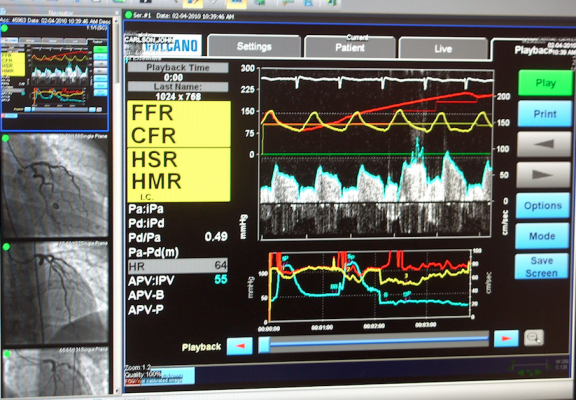
September 8, 2021 — Adding systematic fractional flow reserve (FFR) assessment to coronary angiography does not reduce costs or improve quality of life in patients undergoing diagnosis for chest pain, nor does it reduce major adverse cardiac events or revascularization rates. That was the finding of late-breaking RIPCORD2 study presented in a Hot Line session at the 2021 European Society of Cardiology (ESC) Congress.[1]
In patients with chest pain, coronary angiography alone does not accurately determine whether or not there is reversible myocardial ischemia. The RIPCORD concept proposes routine pressure wire assessment of all epicardial vessels amenable to revascularization at the stage of diagnostic angiography, and before triage to medical therapy alone, percutaneous coronary intervention (PCI), or coronary artery bypass grafting (CABG).
The original 200 patient proof-of-concept RIPCORD study previously showed that when systematic FFR data were added to information from coronary angiography in patients with chest pain, the management plan changed in 26% of the population.[2] RIPCORD2 is the first randomized trial to examine whether systematic FFR assessment of all relevant coronary arteries at the stage of the diagnostic angiogram would provide superior resource utilization, quality of life and clinical outcomes when compared to angiographic assessment alone.
The open label trial enrolled 1,100 patients undergoing invasive coronary angiography for the investigation of angina or non-ST elevation myocardial infarction. The mean age was 64 years and 75% were men. All participants had a stenosis of 30% or greater in at least one coronary artery suitable for either PCI or a bypass graft. Patients were randomized to systematic pressure wire–derived FFR after angiography or angiography alone. FFR measurement was performed in all coronary arteries of sufficient calibre for PCI or CABG unless Thrombolysis in Myocardial Infarction (TIMI) grade flow was less than 3. The recommended management plan was reported for all patients.
The co-primary outcomes, assessed at one year, were (a) total hospital costs and (b) quality of life and angina status. Costs incorporated the initial admission and any hospital episode starting within one year after randomization. All inpatient admissions, outpatient visits and attendances at accident and emergency departments were included, but costs for primary care or routine medications were not. Quality of life was assessed using the visual analogue scale of the EuroQol EQ-5D-5L questionnaire and angina status was assessed using the Canadian Cardiovascular Society scale.
Prespecified secondary endpoints included clinical events (all-cause mortality, non-fatal stroke, non-fatal myocardial infarction and unplanned revascularization) and management strategy (optimal medical therapy alone, PCI, or CABG).
The median total hospital cost over the one-year period was similar in the two groups: £4,510 (interquartile range [IQR] 2721–7415) for FFR plus angiography versus £4,136 (IQR 2613–7015) for angiography alone (p=0.137). There were no differences between groups in inpatient and outpatient costs, nights in hospital or the number of outpatient visits. There were no differences between groups in quality of life and angina status at one year.
Regarding secondary endpoints, there were a similar number of deaths, strokes, myocardial infarctions, and unplanned revascularizations in both groups. Nor were there significant differences between groups in the selected management plan. However, in the FFR group, the strategy was chosen immediately after the catheter laboratory procedure in more than 98% of patients whereas a further test was required in 14.7% of patients in the angiography alone group.
Funding for the trial was from an unrestricted research grant from Boston Scientific Corp.
Disclosures: NC has received unrestricted grants from HeartFlow, Boston Scientific, Beckmann Coulter; speaker fees/consultancy from HeartFlow, Boston Scientific, Abbott, Edwards and travel sponsorship from HeartFlow, Biosensors, Edwards and Medtronic.
Find more ESC Hot Line late-breaking study news
References:


 January 05, 2026
January 05, 2026 









